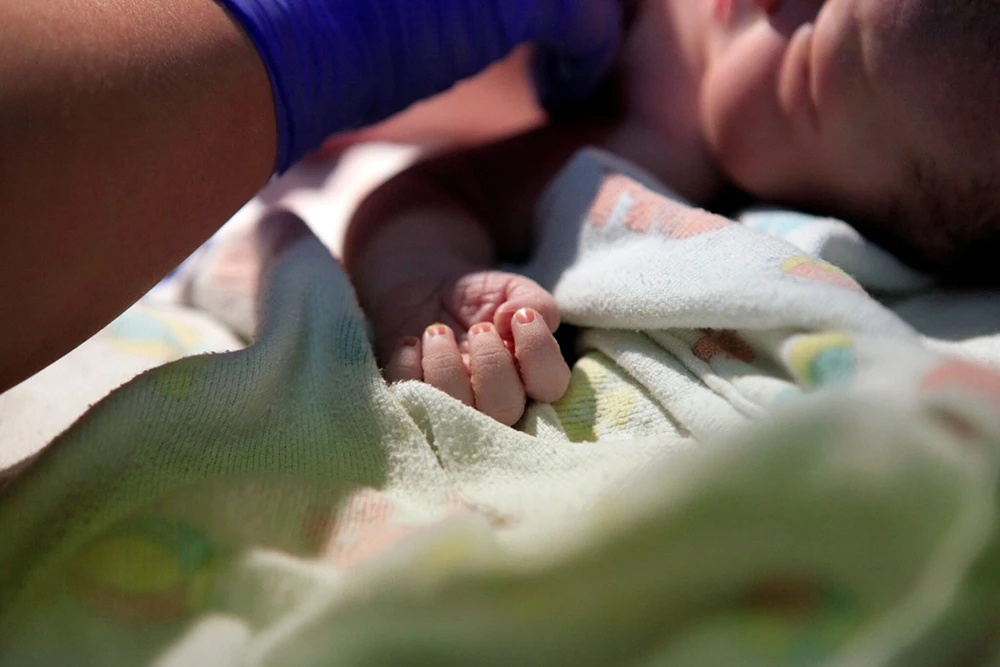Birth Injury Compensation: How Lawyers Determine the Full Impact
By: Simon Law | October 7, 2025

Birth injuries can change the course of a family’s life. These injuries can significantly impact a child’s future, affecting not only their health but their ability to go to school, get a job, and live independently, negatively impacting the child’s overall quality of life. While some injuries heal with time and minimal treatment, others result in lifelong medical, financial, and emotional challenges. Determining the full impact of a birth injury is essential for securing fair birth injury compensation that meets both immediate and long-term needs.
That is where hiring an experienced birth injury lawyer is critical. Birth injury lawyers and birth injury law firms work to secure compensation for children affected by birth injuries, helping their families cover medical expenses, therapy, and related costs. Attorneys investigate how the injury occurred, assess the damages, and work with medical and financial experts to calculate the true costs. At Simon Law, we approach every case with meticulous attention to detail, fighting to ensure that families have the resources they need for the future.
In this blog, we’ll explain how we investigate birth injury compensation claims, including reviewing medical records, consulting with experts, forecasting future costs, and calculating the value of a claim.
Understanding the Nature of a Birth Injury
Types of Birth Injuries That May Qualify for Compensation
Not every complication at birth will lead to a legal claim. However, when medical negligence causes an injury with lasting consequences, those injured children may be eligible for birth injury compensation. Compensation is available for children who have suffered a severe birth injury, and legal claims can help cover the costs associated with a child’s injuries. Some of the most common injuries that lawyers see in these cases include:
- Hypoxic Ischemic Encephalopathy (HIE): A type of brain damage caused by oxygen deprivation during labor or delivery. HIE can result in lifelong disabilities such as developmental delays, learning difficulties, or motor impairments.
- Cerebral Palsy: Often linked to oxygen loss or trauma during delivery, cerebral palsy is a permanent condition that affects movement, posture, and muscle coordination. According to research, cerebral palsy occurs in about 2–3 of every 1,000 live births.
- Erb’s Palsy (Brachial Plexus Injury): This nerve injury, often caused by shoulder dystocia or improper use of forceps, can lead to partial or complete loss of function in a child’s arm. Some children recover with therapy, while others face lifelong weakness or paralysis.
- Brain Bleeds (Intracranial Hemorrhages): Excessive pressure or trauma during delivery may cause bleeding in the brain. Outcomes range from short-term seizures to permanent cognitive or motor impairments.
- Fractures or Dislocations: Broken bones, especially to the clavicle or shoulder, are sometimes the result of excessive force or delivery tool misuse. While many fractures heal, some may indicate a more serious underlying complication.
It’s important to distinguish between temporary injuries, such as minor fractures that heal with treatment, and permanent injuries that affect a child’s development, mobility, or independence. When a child’s injury is permanent, the ongoing care and support needed for the child’s injuries can place a significant burden on the entire family. Families dealing with long-term conditions face not only high medical costs but also emotional and financial burdens for years to come. That’s why careful legal evaluation is so critical.
How Birth Injuries Happen
While not all birth injuries are due to negligence, some occur due to complications that could have been prevented with proper medical care. Common causes include:
- Misuse of forceps or vacuum extractors
- Failure to perform a timely C-section
- Inadequate monitoring of fetal distress
- Oxygen deprivation during labor or delivery
Birth injuries that occur during labor and delivery due to errors by health care professionals is negligence.
Negligent health care providers, including labor and delivery nurses and registered nurses, can be held accountable.
How Lawyers Assess the Full Impact on the Child & Family
Reviewing Medical Records & Diagnostic Reports
Attorneys begin by examining detailed medical records from prenatal care, labor, delivery, and neonatal treatment. These records are cross-checked with diagnostic reports and prognoses to build a timeline. Lawyers also work with medical experts to confirm whether the injury was the result of negligence. In addition, attorneys gather evidence of medical expenses and medical bills, ensuring all immediate and long-term costs are documented as part of the legal process.
- Prenatal, birth, labor, and neonatal care documentation
- Diagnoses, treatments, prognoses
- Collaborating with medical experts to validate evidence
The legal process also includes evaluating lost opportunities, including lost future wages for children.
Consulting with Medical & Life Care Experts
One of the most important parts of evaluating a birth injury compensation claim is bringing in outside experts. Lawyers rely on a network of medical and economic specialists who can provide insight into the child’s current condition and future needs. This collaboration ensures the compensation request accurately reflects the lifelong impact of the injury.
- OBGYNs and Labor and Delivery Nurses: These experts evaluate the conduct of the healthcare providers and assess for potential errors or malpractice, providing valuable support in identifying how medical decisions may have contributed to the injury.
- Neonatologists, Pediatric Neurologists & Developmental Specialists: These experts evaluate how the injury affects the child’s brain, nerves, and overall development. They can determine whether a condition such as cerebral palsy, seizures, or developmental delays is likely to worsen over time. Their medical opinions carry significant weight in court when proving the extent of an injury.
- Life Care Planners: Life care planners develop a roadmap for the child’s future needs. This may include long-term therapy, ongoing medications, mobility equipment, in-home nursing support, and even modifications to the family’s home or vehicles. They estimate future medical expenses and future medical needs, helping ensure families are not left struggling years down the road.
- Economic Experts: Economists calculate the financial burden of a birth injury, factoring in inflation, wage growth, and the child’s potential lost earning capacity. They also help quantify the indirect costs, such as a parent leaving the workforce to provide full-time care. Disease control and preventive care are also considered in long-term planning to accurately assess ongoing and future costs.
By working together, these experts provide a clear picture of both the medical and financial realities of a birth injury. Their testimony is often critical in negotiations and trials, giving families the strongest possible case for the compensation they deserve.
Calculating Short-Term & Long-Term Costs
A major part of birth injury compensation claims is determining both current and future expenses, which may include:
- Surgeries, medications, and therapies
- Mobility or assistive devices
- Special education needs
- Home and vehicle modifications
- Future lost income and reduced earning capacity for the child
These calculations help determine the financial compensation, birth injury compensation amounts, and the potential birth injury settlement amount that a family may receive.
Evaluating Emotional & Psychological Impact
Compensation isn’t limited to financial costs; it can also include pain and suffering experienced by both the child and family. Lawyers also evaluate the emotional distress parents endure and the reduced quality of life for the child. These intangible damages can significantly influence the total value of a claim.
Determining Legal Liability & Causation
To pursue a claim, attorneys must connect the injury directly to negligent care. This often involves identifying liable parties, which may include OB-GYNs, nurses, anesthesiologists, or the hospital itself. Establishing causation is critical to proving a valid case, and in many situations, filing a medical malpractice claim or pursuing medical malpractice lawsuits may be necessary to secure compensation.
Estimating Birth Injury Compensation
Factors That Influence the Value of Compensation
The value of compensation for a birth injury claim depends on several factors:
- Severity and permanence of the injury
- Impact on daily life and long-term prognosis
- Level of medical negligence involved
- The cost of lifelong medical care and support
These factors directly influence the potential settlement or verdict amount, which can vary widely depending on the specifics of the case, including future medical expenses and the anticipated need for future medical care.
How Lawyers Answer “How Much Compensation for Birth Injury?”
Families often ask: “How much compensation can we expect for a birth injury?” The reality is, there is no one-size-fits-all answer. Each case is unique, and compensation is based on the specifics of the injury, the degree of negligence, and the projected lifetime costs of care. To maximize your compensation, families should consult a top birth injury attorney who can help file a birth injury claim and guide you through the legal process. A lawyer can provide a clearer estimate after reviewing the case in detail.
Common Questions About Birth Injury Compensation
What qualifies as a birth injury for compensation?
A birth injury qualifies for compensation when it results from medical negligence during pregnancy, labor, or delivery, including injuries that occur during a child’s birth. Injuries must cause measurable harm to the child or family, such as long-term disability, developmental delays, or costly medical needs.
A child’s birth injury can be more complex and costly than a typical medical malpractice case, often requiring specialized care and resulting in higher settlements due to the lasting impact on the child’s health.
What is the time limit for filing a birth injury claim?
In Missouri, most claims for medical malpractice must be filed within two years of the injury. However, in many states including Missouri, exceptions exist for minors and may be used to toll the statute of limitations.
Do I need a lawyer to file a claim?
While it’s possible to file a claim without legal representation, birth injury cases are complex and require expert testimony, extensive documentation, and negotiation with hospitals, doctors, and insurance companies. Hiring a top birth injury lawyer or an experienced birth injury law firm rather than one focused on overall medical malpractice can increase the chances of a successful outcome, as they have a proven track record in handling such cases. Birth injury lawyers have the expertise to handle complex cases and guide families through the legal process. Having a lawyer significantly increases the chances of securing fair compensation.
How long do I have to file a claim for a birth injury?
For children, Missouri law allows for additional time to file beyond the standard two years, but deadlines vary depending on the circumstances.
According to Rev. State. Mo. § 516.105, if “the person bringing the action is a minor less than eighteen years of age, such minor shall have until his or her twentieth birthday to bring such action.”
However, if you’re unsure about the statute of limitations on your child’s potential case, consult with an experienced birth injury lawyer at Simon Law.
Speak to a Trusted Birth Injury Lawyer at Simon Law
At Simon Law, we know that no amount of compensation can undo the pain caused by a preventable birth injury. If your child suffered a brain injury or other birth trauma, you may be entitled to birth injury settlements that can provide the medical care, financial support, and peace of mind your family deserves.
The Simon Law team has secured multi-million dollar verdicts for families facing the lifelong effects of medical negligence. Every injured child deserves justice and support. If your child has suffered a birth injury, don’t wait. Contact us today for a free case evaluation.


